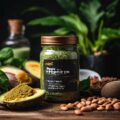Embracing a Compassionate Plant-Based Lifestyle
Welcome to your journey towards a more compassionate and sustainable way of living! Adopting a plant-based diet is not just about personal health; it’s a powerful way to show kindness to animals, reduce your environmental impact, and nourish your body and soul. This ultimate plant-based shopping list will guide you through the wonderful world of plant-based eating, helping you create delicious, nutritious meals that align with your values.
Colorful Fruits and Vegetables: Nature’s Rainbow
The foundation of any plant-based diet is a vibrant array of fruits and vegetables. These nutritional powerhouses are packed with vitamins, minerals, and antioxidants that support your overall wellbeing. When shopping, aim to include:
- Leafy greens: Spinach, kale, collard greens, and Swiss chard
- Cruciferous vegetables: Broccoli, cauliflower, and Brussels sprouts
- Colorful produce: Bell peppers, tomatoes, carrots, and sweet potatoes
- Berries: Strawberries, blueberries, and raspberries
- Citrus fruits: Oranges, lemons, and grapefruits
Remember, eating a variety of colors ensures you’re getting a wide range of nutrients. Let your plate be a canvas of compassion and health!
Wholesome Grains and Legumes: The Heart of Plant-Based Nutrition
Grains and legumes are excellent sources of complex carbohydrates, fiber, and plant-based protein. They provide sustained energy and help you feel satisfied. Include these staples in your shopping cart:
- Whole grains: Quinoa, brown rice, oats, and whole grain pasta
- Legumes: Lentils, chickpeas, black beans, and kidney beans
- Whole grain bread and wraps
- Ancient grains: Amaranth, millet, and teff
These versatile ingredients can be the base for countless nourishing meals, from hearty soups to satisfying grain bowls.
Plant-Based Proteins: Compassionate Alternatives
Contrary to common misconceptions, getting enough protein on a plant-based diet is easy and delicious. Here are some protein-rich options to add to your list:
- Tofu and tempeh
- Seitan (wheat gluten)
- Nuts and seeds: Almonds, walnuts, chia seeds, and flaxseeds
- Nutritional yeast
- Plant-based protein powders (pea, hemp, or rice protein)
These protein sources not only nourish your body but also reflect your commitment to a more compassionate world.
Dairy Alternatives: Creamy and Kind
The world of plant-based milk and dairy alternatives has exploded in recent years, offering delicious options that are kind to animals and the planet. Consider adding these to your cart:
- Plant-based milk: Almond, oat, soy, or cashew milk
- Vegan cheese alternatives
- Plant-based yogurts
- Coconut cream (for making whipped cream)
Experiment with different options to find your favorites. You’ll be amazed at how satisfying these alternatives can be!
Pantry Essentials: Building Blocks of Plant-Based Cooking
A well-stocked pantry is key to creating delicious plant-based meals. Don’t forget these essentials:
- Vegetable broth
- Canned tomatoes
- Herbs and spices: Turmeric, cumin, paprika, and nutritional yeast
- Healthy oils: Extra virgin olive oil and coconut oil
- Vinegars: Apple cider vinegar and balsamic vinegar
- Maple syrup or agave nectar (as natural sweeteners)
These ingredients will help you create flavorful, satisfying meals that nourish both body and soul.
Frequently Asked Questions
Q1: Is a plant-based diet expensive?
A: Not necessarily! While some specialty items can be pricier, staples like beans, grains, and seasonal produce are often very affordable. Buying in bulk and focusing on whole foods can make plant-based eating budget-friendly.
Q2: How can I ensure I’m getting enough protein on a plant-based diet?
A: By including a variety of legumes, nuts, seeds, and whole grains in your diet, you can easily meet your protein needs. Foods like tofu, tempeh, and seitan are also excellent protein sources.
Q3: Are there any nutrients I should be particularly mindful of on a plant-based diet?
A: While a well-planned plant-based diet can meet all your nutritional needs, it’s important to pay attention to vitamin B12, iron, zinc, and omega-3 fatty acids. Consider speaking with a nutritionist for personalized advice.
Q4: How can I make plant-based eating more convenient?
A: Meal prep is key! Batch cook grains and legumes, pre-chop vegetables, and keep frozen fruits and veggies on hand. Also, explore plant-based convenience foods for busy days.
Q5: What if I’m the only one in my household eating plant-based?
A: Focus on meals that can be easily customized, like build-your-own bowls or tacos. Cook plant-based proteins alongside other proteins for family meals. Remember, every plant-based meal is a step towards compassion, even if it’s not an all-or-nothing approach.
Embarking on a plant-based journey is a beautiful way to align your diet with your values of compassion and sustainability. Remember, it’s not about perfection, but about making choices that feel right for you. With this ultimate plant-based shopping list, you’re well-equipped to create nourishing meals that are kind to your body, the animals, and the planet. Happy shopping, and may your plant-based adventure be filled with delicious discoveries and heartwarming moments!









